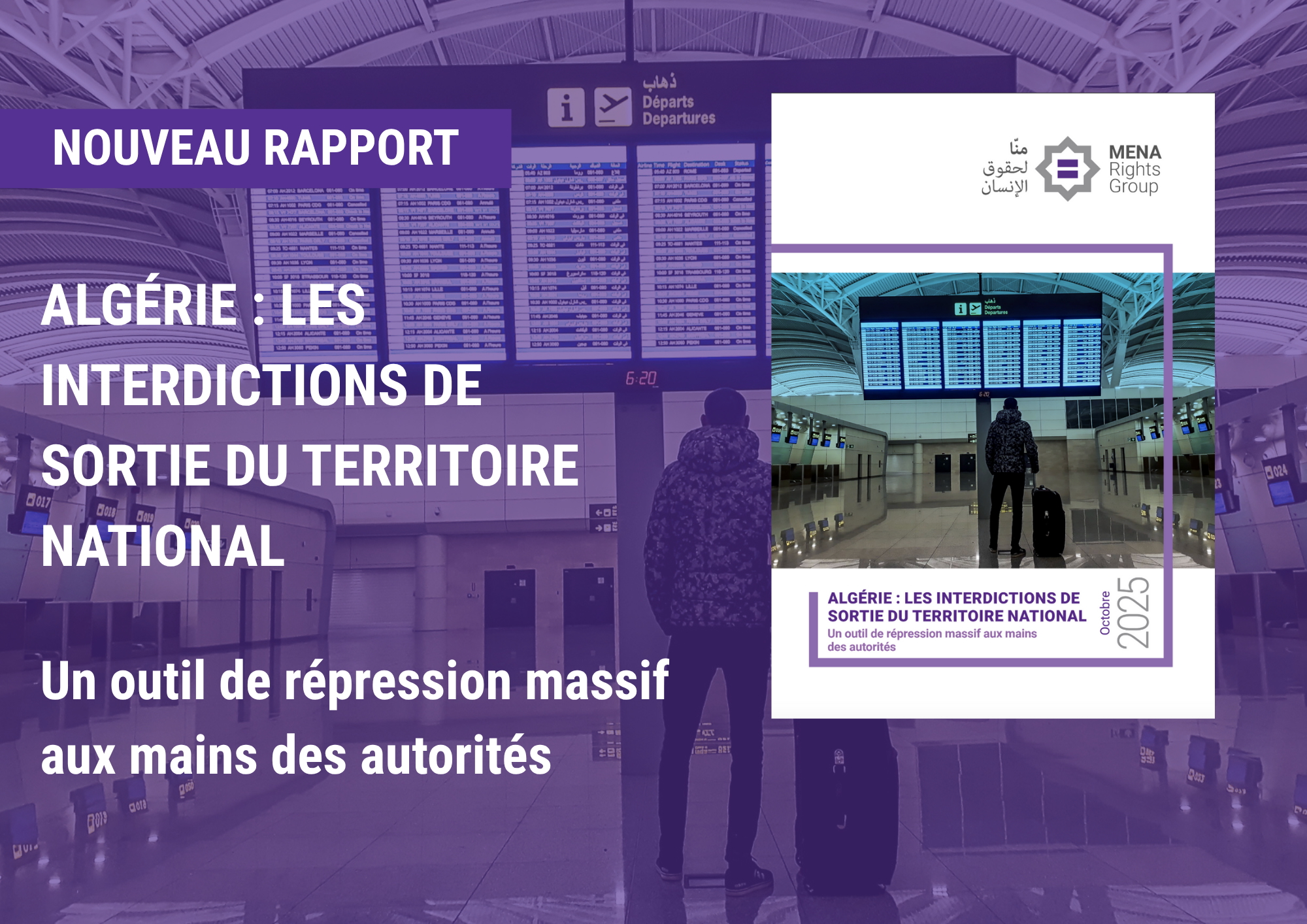October 29, 2025

Geneva, October 30, 2025 – MENA Rights Group, in a new report entitled “Algeria: Travel bans, a tool of mass repression in the hands of the authorities,” examines how the Algerian authorities employ travel bans, known in Algeria as “ISTN” (Interdiction de sortie du territoire), as a mechanism of political control to suppress dissenting voices.
Based on nearly thirty testimonies and documented cases, the report demonstrates that, in the context of the repression of the Hirak protest movement, the authorities have significantly intensified their use of travel bans in recent years.
The testimonies gathered reveal that ISTN are systematically used to isolate critical voices, criminalise dissent, and sustain a pervasive atmosphere of intimidation. In many instances, individuals receive no prior notification and only discover the existence of a travel ban when attempting to leave the country. These measures are frequently imposed without a written, reasoned decision and without any avenue for appeal. In some cases, individuals remain subject to travel restrictions for years, even after legal proceedings have concluded or the bans have been formally lifted. This persistent uncertainty fosters a climate of fear and self-censorship, further eroding freedom of expression and civic participation within Algerian society.
Until recently, ISTNs were set out in Article 36 bis 1 of the Code of Criminal Procedure. This much-criticised article authorised the public prosecutor, on the basis of a simple police report, to impose a travel ban for a period of three months, renewable once, and, in cases involving “terrorism” or corruption, for an indefinite duration.
In August 2025, following the adoption of Law No. 25-14 amending the Code of Criminal Procedure, Article 36 bis 1 was replaced by Article 49. Although certain amendments, notably the requirement for the public prosecutor to issue a reasoned order and to notify the person concerned, who may then request its lifting, represent steps in the right direction, it remains too early to determine their actual impact.
Significant uncertainties remain, particularly regarding the lack of a judicial framework to oversee travel bans and the absence of remedies clearly established in law. These shortcomings are further aggravated by insufficient legal safeguards to ensure that such measures respect the principles of necessity and proportionality.
Even more worrying is that Article 49 broadens the scope of ISTNs to include the offence of “undermining state security” as grounds for indefinite renewal, alongside terrorism. However, this vague and broad concept presents the same risks of abuse as anti-terrorism legislation, allowing for arbitrary use against political opponents, journalists or human rights defenders. These concerns are part of a broader context marked by recurring criticism of Article 87 bis of the Algerian Penal Code, whose particularly broad definition of terrorism is regularly used to restrict fundamental freedoms.
In July 2025, the Constitutional Court was called upon to assess the constitutionality of Article 49 of the Code of Criminal Procedure. Although several members of Parliament contended that this provision infringed Article 49 of the Constitution, which guarantees the right to freedom of movement, the Court ultimately rejected these arguments and confirmed the provision’s compatibility with the Constitution.
While ISTNs are sometimes applied in corruption cases, the report shows that their use has gradually expanded to target political opponents, journalists, trade unionists and human rights defenders, thereby silencing those who dare to express criticism. By restricting freedom of movement in this way, the Algerian authorities are violating the Constitution and their international obligations, in particular Article 12 of the International Covenant on Civil and Political Rights, to which Algeria is a party, which protects the right of everyone to leave their country.
“Travel bans have become a political tool to silence those who dare to criticise the government. Algeria must put an end to these practices and respect its citizens' fundamental right to freedom of movement,” said Alexis Thiry, legal adviser at MENA Rights Group.
MENA Rights Group calls on the Algerian authorities to end the arbitrary use of travel bans and to bring national legislation into line with the Constitution and its international obligations. All persons concerned must be informed in a transparent and justified manner and have a genuine remedy to challenge the decision.
The report will be presented during a webinar dedicated to this issue, organised by EuroMed Rights and MENA Rights Group on October 31, 2025.






